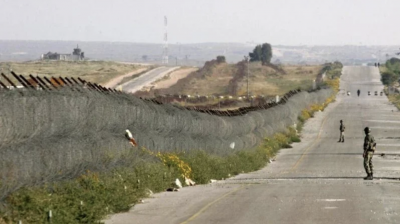
Palestinians celebrate with fireworks on a street in Deir al-Balah, in the central Gaza Strip, after Hamas announced it had accepted a truce proposal for May 6, 2024, as part of the ongoing conflict between Israel and the Palestinian militant group Hamas. (Credit: AFP)
Egyptian intelligence services discreetly altered the terms of a cease-fire proposal that Israel had already approved at the beginning of May before presenting it to Hamas, CNN reported late Tuesday, citing three sources close to the talks. According to the sources, the changes to the deal derailed an agreement that could have led to the release of Israeli hostages and Palestinian prisoners, as well as a temporary cessation of hostilities in the Gaza Strip.
The sources told CNN that the cease-fire agreement announced by Hamas on May 6 was not approval of the deal the Qataris or Americans thought had been submitted for final review; rather Hamas approved a modified document. CNN, citing a Hamas document it saw outlining the deal, reported that the agreement the group approved included "achieving a permanent cease-fire and a 'sustainable calm' to be reached in the second phase of the three-stage deal."
The sources CNN quotes said the changes sparked a wave of anger and indignation among American, Qatari and Israeli mediators. "We've all been duped," one of them told the news outlet.
An aborted agreement
At the end of April, an Egyptian mediation team had visited Israel to finalize the details of a truce providing for the release of Israeli hostages in exchange for a pause in the fighting and the return of Palestinian prisoners. The talks, underway since the failure of truce negotiations in December, appeared on the verge of success. Showing greater flexibility, Israel agreed to release more Palestinian prisoners in exchange for fewer hostages and to allow Gazans to return to the north of the enclave without restriction.
Three weeks later, with cease-fire negotiations at an impasse, the parties are reportedly now questioning the motives of Egypt, a long-standing intermediary between Israel and Hamas.
Changes to satisfy Hamas
The three sources told CNN that Ahmed Abdel Khalek, a senior Egyptian intelligence official and deputy to Egyptian General Intelligence Director Abbas Kamel, was in charge of the changes to the deal as presented to Hamas. Abdel Khalek reportedly the Israelis and Hamas different things. Additional Hamas demands were, the sources said, inserted into the initial agreement, which Israel had tacitly approved, without informing the other mediators or the Israelis. "All sides were under the assumption the Egyptians provided the same document,” one of the sources told CNN.
Indignation among mediators
Bill Burns, CIA director and chief US negotiator for the cease-fire, was in the region when the Egyptians reportedly changed the terms of the agreement.
According to CNN, one source said that Burns was "angry and embarrassed" by the changes, fearing that the affair would suggest that he was unaware of or had not informed the Israelis of the changes.
Qatari Prime Minister Mohammed bin Abdulrahman bin Jassim Al Thani, for his part, informed Israeli intelligence that Egypt had acted alone, the sources told the US media outlet.
In the wake of the incident, American and Qatari delegations returned to Cairo for further negotiations. However, according to sources quoted in the US media, the talks are "on hold" and Israeli forces have stepped up their strikes on the south Gaza town of Rafah since May 6.
One of the sources CNN spoke to suggested that if talks resumed, it would be expected that the Qataris would play a bigger role. However, given Egypt's proximity to Hamas and Israel's preference for Egypt over Qatar, it is likely Egypt would remain central to negotiations.
The CNN reports adds that, when contacted, the Egyptian government declined to comment on the sources' claims.
